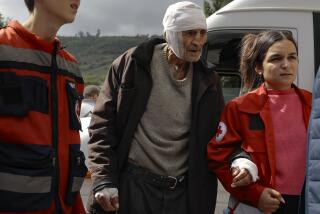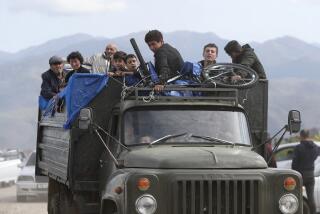Gorbachev Prepares to Step Down : Kremlin: The Soviet president bids farewell to his staff. Violence continues in Georgian capital and erupts again in Armenian enclave.
- Share via
MOSCOW — Soviet President Mikhail S. Gorbachev bade a dignified farewell to his Kremlin staff on Tuesday and scheduled a televised speech for today in which, by all accounts, he will resign his office.
Russian Federation President Boris N. Yeltsin, the man who inherits Gorbachev’s mantle as leader of a giant nuclear superpower, said that Gorbachev will pass him the launch controls for Soviet strategic weapons immediately after the expected resignation speech, the Russian Information Agency reported.
Meanwhile, violence continued to flare in parts of the troubled empire that Gorbachev will leave behind. Heavy shelling resumed between rebels and pro-government forces in the Georgian capital of Tbilisi, and at least 20 Armenians and Azerbaijanis were reported killed in renewed clashes in the disputed Nagorno-Karabakh region.
In Moscow, the Council of the Republics, the only one of the central Soviet legislature’s two chambers still functioning, convened to discuss how best to dissolve itself, now that the country it represents no longer exists. It decided to hold a final session on Thursday, when it is expected to recognize the new Commonwealth of Independent States as the Soviet Union’s full legal successor.
Gorbachev’s resignation has been expected almost daily since 11 former Soviet republics signed the agreement creating the commonwealth on Saturday, in effect making him president of a nonexistent country.
According to reports from his final Kremlin meeting, Gorbachev thanked his staff of about 60 for their work, promised they would not remain unemployed and said that he has achieved what he had worked for, although he wished that things had turned out differently.
Throughout the day, one aide said, the Soviet president had masses of documents copied, while other staffers were busy shredding their work papers.
Officials ranging from the Soviet president’s spokesmen to Deputy Russian Prime Minister Gennady E. Burbulis said that Gorbachev will resign by tonight.
His televised address to the nation of 290 million, which he has led since early 1986, is scheduled to air live at 7 p.m. Moscow time (9 a.m. PST) and last about 15 minutes.
The terms of Gorbachev’s resignation, worked out with Yeltsin in a prolonged meeting on Monday, “will allow him to continue his political and civic activity,” Burbulis said.
The Soviet president is reportedly to receive his current monthly wage of 4,000 rubles--a mere $44 according to the tourist exchange rate of the collapsing ruble but about 80 times a factory worker’s pay--plus a city apartment, a dacha, two cars and 20 bodyguards and servants.
Gorbachev told the Italian ambassador to Moscow on Tuesday that he plans to head an international political and economic research center known as the Gorbachev Fund. He emphasized that he does not aim to directly oppose the Yeltsin administration, but rather to further the ideals that underlay his own perestroika reforms.
In the near term, he plans to use his great international authority to lobby for Western aid for Yeltsin and the former Soviet republics as they struggle through painful reforms, Gorbachev spokesman Alexander Likhotal said.
Andrei S. Grachev, Gorbachev’s press secretary, told Russian Television that at Monday’s meeting with Yeltsin, “issues of the transfer of power were discussed, not only from one man to another, from one president to another, but from one state to another.” He indicated that Yeltsin and Gorbachev may even work out a ceremony for the power transfer, saying “there is still a chance to improvise and observe civilized norms.”
With Gorbachev’s resignation so clearly imminent, outgoing deputies at the Council of the Republics session spent more time assessing his achievements and dissecting his mistakes than discussing their own fates.
“I am absolutely sure Gorbachev did not foresee such a result of his policies,” said Roman P. Rugin, a writer and deputy from the Russian Federation. “All the time he was maneuvering, swerving left, right, up and down. His attention was entirely engaged by political manipulation, and that’s why he was always caught unawares by reality. He was always late--that was his trademark.”
The Council of the Republics decided to dissolve itself on Jan. 2; Gorbachev and Yeltsin issued a joint order on Tuesday decreeing the dissolution of all other Soviet government bodies as of Jan. 2, as well.
With Soviet troops withdrawing from parts of the strife-torn Caucasus Mountains region now that the country where they kept order is defunct, the effects of the Soviet demise could be felt in an upsurge of violence.
Reports from Azerbaijani sources in the disputed territory of Nagorno-Karabakh said that 20 people were killed in an Armenian assault on the Azerbaijani village of Meshali.
Clashes in the area are expected to continue to escalate as the Soviet troops pull out, depriving the area of a buffer between the Armenians and Azerbaijanis who have been fighting there for about four years.
And in the neighboring southern republic of Georgia, insurgents battled pro-government troops in the very center of the capital, Tbilisi, for the third day, lighting the sky with incendiary grenades and heavy shelling.
Georgian diplomats in Moscow said that the rebels, intimidated by pro-government reinforcements, had begun to retreat from their siege on the central government building where President Zviad Gamsakhurdia is caught under their barrages. But other reports said that the rebels had declared they would undertake an all-out assault on the building today and would fight on until they forced Gamsakhurdia to resign.
The Tass news agency reported that 51 people have been killed in the three days of fighting and 176 wounded.
Yeltsin said Tuesday that he had spoken recently by telephone with Gamsakhurdia and refused to meet with the Georgian president because of his poor human rights record, but he said he had agreed that Soviet troops would not intervene in the battles.
Prime ministers of the commonwealth also met on Tuesday to discuss economic reform and ways to coordinate the end of state subsidies, a move that will send prices skyrocketing next month in the three Slavic republics under the original commonwealth agreement of Dec. 8.
Commonwealth members accepted the Russian reform plan, the most radical of the republics’ proposals, as the basis for their joint work.
According to price ceilings the Russian government placed on crucial items, the cost of milk and bread will triple, matches will quadruple, public transportation will double and vodka will cost up to 4 1/2 times what it does now. Prices on goods aside from such necessities are likely to rise more, as there will be no ceilings on them.
Russian Deputy Prime Minister Burbulis turned down requests from some of the eight republics that joined the commonwealth on Saturday to put off the price reforms, now set for Jan. 2, for at least another two weeks. But he agreed to try to ease the extreme shortage of cash expected to arise as most prices rise to triple or more their current level, and to discuss the issue further.
Further decisions on forms of the commonwealth’s political and economic coordination are expected at the group’s next meeting in the Belarus capital of Minsk this Monday.
More to Read
Sign up for Essential California
The most important California stories and recommendations in your inbox every morning.
You may occasionally receive promotional content from the Los Angeles Times.










